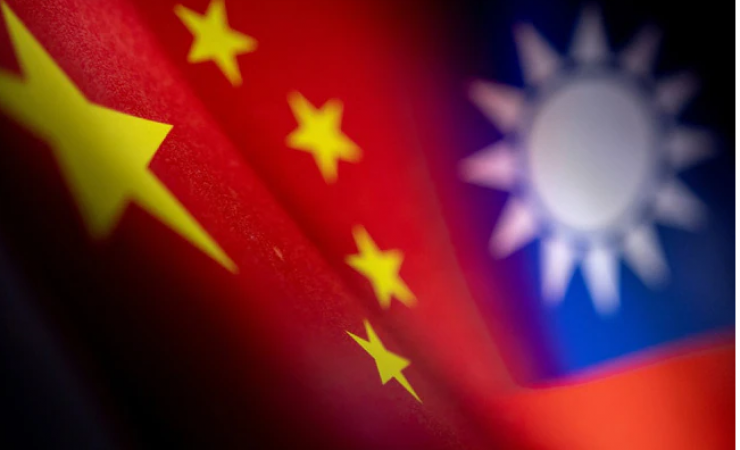
BEIJING: In apparent retaliation for US House Speaker Nancy Pelosi's visit to the autonomous island, China has suspended some trade with Taiwan.
Sanctions include the suspension of imports of some Taiwanese fruits and fish, as well as natural sand exports to the island.
According to the Taiwanese government, China is Taiwan's largest trading partner. Bilateral trade between the two countries totaled $273 billion last year, or 33 percent of the island's total trade with the rest of the world.
The potential impact of rising tensions between Taipei and Beijing on Taiwan's semiconductor industry also worries experts.
The democratic self-governing island of 24 million individuals is a world leader in the production of semiconductor chips, an essential component for nearly all contemporary electronics, including cars, refrigerators and mobile phones.
China's Taiwan Affairs Office announced on Wednesday that it would stop importing chilled and frozen horse mackerel as well as grapes, lemons and other citrus fruits from Taiwan.
Chinese customs officials claimed in a separate statement that the ban on import of citrus fruits was due to "pest control" and "excessive pesticide residues" and that the ban on import of seafood was due to "COVID prevention".
Meanwhile, China's commerce ministry has halted imports of natural sand from Taiwan, a key ingredient in the manufacture of semiconductor chips.
According to analysts at ING Group on Wednesday, Nancy Pelosi's visit to Taiwan has sparked expected outrage from Chinese officials.
Taiwanese officials responded by claiming that the impact of China's sand export ban would be "limited" and that "less than one percent" of Taiwan's total demand is met by Chinese sands.
Many Taiwanese products have previously been banned from entering China due to rising tensions. After China last year banned the import of pineapples from the island, some varieties of apples were imported earlier in the year under the pretext of "pest control". Taiwanese grouper fish, a premium seafood item from Taiwan, was also banned earlier this year due to the discovery of some illegal drugs.
Beijing's recent announcements come after Beijing issued a stern warning that it would retaliate in retaliation and coincided with Pelosi's visit to Taiwan, the first by a speaker in 25 years.
Following Pelosi's visit, the nation's military announced that it was launching "a number of targeted military operations to counter the situation".
A representative of China's foreign ministry said during a press conference on Wednesday that "the separatist forces of the US and Taiwan must take responsibility and pay the price for their mistakes." When asked about whether the most recent export ban was meant to punish Taiwan for Pelosi's visit, she replied, "Please ask the department in charge," refusing to answer questions directly.
China is in a tense situation during Pelosi's visit.
The 20th Party Congress of the Communist Party will see a change in the top leadership of the party. At the meeting, President Xi Jinping is expected to make a historic bid for a third term in office.
Domestic unrest is rife as the country's economy contracts at its slowest rate in more than two years as a result of strict Covid lockdowns and a faltering real estate market. The youth unemployment rate has reached an all-time high. Due to a national mortgage crisis and several rural bank scams, there is increasing social unrest.
Results on Global supply chains
Analysts and traders are concerned about the impact of rising China-Taiwan tensions on the world economy and the outlook for inflation.
Major stock indices closed in the red in Tuesday's trading session and safe-haven currencies rose. Asian markets recovered slightly on Wednesday morning, but risk sentiment remains subdued.
According to Edward Moya, senior market strategist at Oanda, "China's response to Pelosi's visit to Taiwan could impact supply chain and demand, which could keep inflationary pressures strong."
The pandemic and war in Ukraine have already disrupted the international supply chain. Recently, the World Bank reported that inflation is approaching double digits in many countries.
Any conflict in Taiwan, a major supplier of semiconductors, could make global chip shortages worse, which is already straining the auto industry. The Taiwan Strait is an important shipping route for ships carrying goods from Asia to the West.
Taiwan Semiconductor Manufacturing Company, the largest contract chip maker in the world, is essential to the functionality of products made by tech giants such as Apple, Qualcomm and Nvidia.
This week, TSMC chairman Mark Liu said in an interview with CNN that a war between China and Taiwan would be bad for everyone. He claimed that "if you use military force or launch an invasion,
Ninety percent of the world's most advanced chips are produced by TSMC, one of Asia's most valuable companies.
Meanwhile, analysts from the Eurasia Group predicted that Beijing would launch cyberattacks, impose economic sanctions, and launch diplomatic protests in addition to a "unprecedented" display of military force in the Taiwan Strait.
In a report released on Wednesday, they stated that the "immediate effect on clients will be a moderate but probably temporary disruption of supply chains that traverse the waters around Taiwan, as planes and ships reroute to avoid [People's Liberation Army] exercises."
Depending on the length and severity of the episode, "the lasting impact" will vary, but at the very least, it will prompt more preparation and contingency planning on the part of businesses and policymakers regarding supply chain disruptions, including for semiconductors, they added.
They added that as the 20th party congress draws near, China may reveal additional responses in the days, weeks, and even months to come, indicating that "the potential for crisis may not abate soon."
Pelosi departs from Taiwan China spoke extensively about her visit
China promises military operations near Taiwan In response of Nancy Pelosi's visit